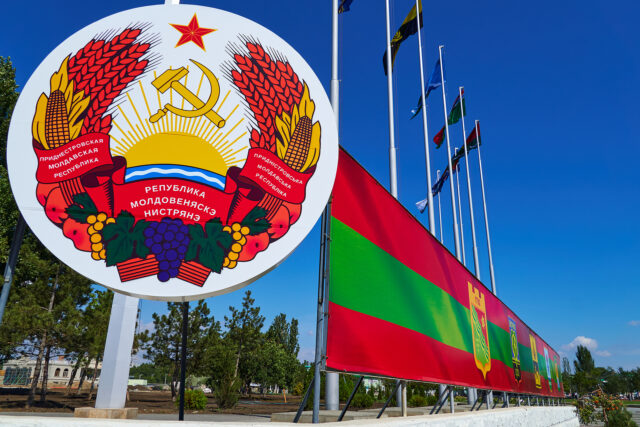
Russo-Ukrainian War Should Doom the ‘5+2’ Negotiations on Transnistria (Part One)
Publication: Eurasia Daily Monitor Volume: 20 Issue: 16
By:

Russia’s war against Ukraine has dealt the coup de grâce to the “5+2” negotiations on the settlement of conflict in Transnistria, the forum where Russia and Ukraine sit next to each other. Moscow and Kyiv have been seated formally at the top of the table, but Russia was always the dominant player by far, manipulating the 5+2 forum against Moldova’s as well as Ukraine’s interests. Western powers have conceded that role to Russia in spite of the Kremlin’s serial military interventions in Moldova, Georgia and Ukraine.
Keeping the 5+2 process alive must be deemed inconceivable after Russia’s re-invasion of Ukraine. Yet, some process-addicted diplomats envisage resuscitating this same forum once the war in Ukraine subsides. They only acknowledge a temporary difficulty in “seating Russia and Ukraine together at the table again”—merely a procedural, but not substantive obstacle.
The 5+2 forum took its present shape in 2005 when the European Union and the United States entered it as “observers”—a status inferior to that of the incumbent full members. The European Union and the United States thereby joined the construction that Russian Foreign Minister Yevgeny Primakov had created in 1997 and remains in place officially to date. Russia, Ukraine and the Organization for Security and Co-operation in Europe (OSCE) are “mediators” of an eventual political settlement between Chisinau and Tiraspol as well as “guarantors” of the ultimate settlement. The two Western “observers” amount to little more than appendages within the 5+2 forum itself, but they can and do exert their influence outside this Russian-dominated forum.
The Kremlin had, back in 1997, awarded Kyiv with the role of co-mediator and co-guarantor, as a weak and vulnerable Ukraine was comfortable to Russia in that role. In fact, Ukraine was never able or willing to counterbalance Russia in the 5+2 forum—all the less after itself being invaded by Russia in 2014.
Russia had, from the outset, imposed its definition of this conflict as one internal to Moldova, between two parts of that country, hoping to exempt Moscow of responsibility for igniting the conflict and occupying Transnistria. The Kremlin also imposed its strategic agenda on the 5+2 forum. Its official purpose is to devise a “special status” for Transnistria, on terms to be negotiated between Chisinau and Tiraspol as co-equal parties. Russia envisages the special status as creating a Russian-controlled statelet-within-the-state, influencing Moldova from within in Moscow’s favor. Chisinau and the “observers” find such terms unacceptable, while Russia does not accept anything else. Moreover, Russia refuses to withdraw its troops from Moldova (and disarm Transnistria) without a special status acceptable to Moscow and Tiraspol (see EDM, August 12 and 13, 2020).
The 5+2 format has perpetuated and entrenched Russia’s ground rules of the process: first, the “special status” as an immutable goal (Western participants would differ with Russia over the terms, but they accept and even promote that goal); and second, the conditional linkage between an agreement on the special status and the withdrawal of Russian troops from Moldovan territory. This vicious cycle—no political solution, no troop withdrawal; no troop withdrawal, no political solution—perpetuates the deadlock, to Russia’s advantage.
Compared with the other protracted conflicts in Europe’s East, the 5+2 format is the only one in which Western powers have accepted a role inferior to Russia’s. The US and France co-chaired, with Russia, the Minsk Group on the Karabakh conflict (a defunct forum since 2020); Germany and France were equal participants with Russia and Ukraine in the Normandy Group after Russia’s 2014 invasion of Ukraine (forum defunct since late 2021–early 2022); and the US and the EU are full members alongside Russia in the Geneva International Discussions ongoing since 2008 regarding Abkhazia and South Ossetia (see EDM, December 7, 8, 12, 13, 2022).
By contrast, in the 5+2 format, Russia holds two and a half seats: its own, Tiraspol’s, and Russia’s veto power over the OSCE—an organization that cannot make decisions or even speak on its own behalf without Russian approval. For their part, the observers in the 5+2 arrangement do not independently initiate substantive proposals on political and security issues, nor convene 5+2 meetings, but they can comment on other parties’ proposals.
Participating in the 5+2 forum for 18 years—albeit in an inferior role—the EU and US have lent it a semblance of legitimacy without being able to change its dynamics—or, rather, its stasis. Instead, they have seconded Russia’s view that this forum has no alternative. As a result, finding an alternative and more effective forum is hard to imagine, but publicly emphasizing the lack of alternatives in unison with the Kremlin amounts to encouraging the latter’s intransigence.



